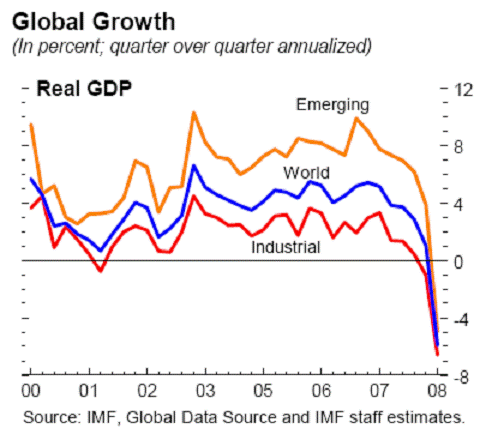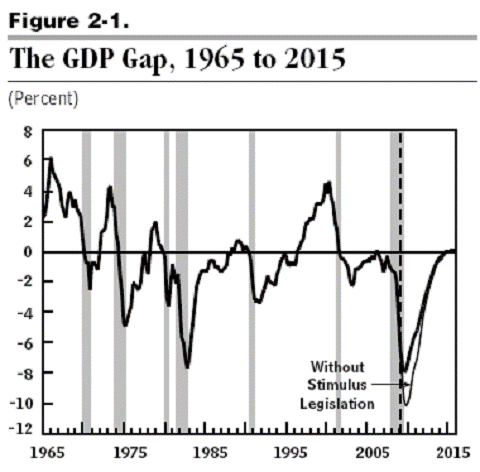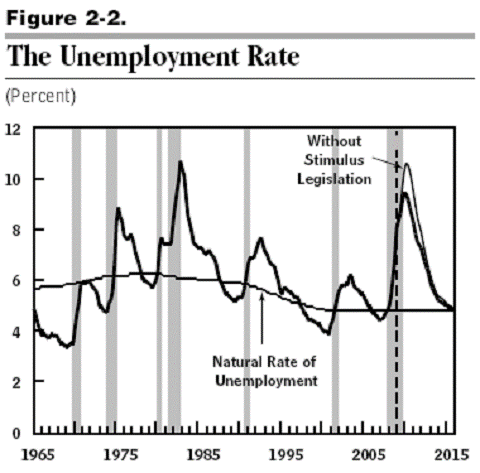Here are the latest CBO forecasts of the output gap and unemployment rate, as well as counterfactual gap and rate that would have taken place in the absence of the stimulus package.
Notice that the no-stimulus counterfactual output gap and unemployment rates are noticeably worse now than only a month ago (see this post). For 2010, the February counterfactual was -6.3% of GDP, now around -10%; the February counterfactual for 2010 was 8.7% unemployment, now it’s nearly 11% (I’m eyeballing the current counterfactuals off of Figures 2-1 and 2-2). The January outlook is discussed here. My guess is that that “massive” stimulus is going to look a lot less “massive” given the severity and duration of this recession.
For those wondering how these estimated effects were obtained (i.e., multipliers), see [1], [2], [3], [4], [5]; for discussion of the stimulus package, see [6], [7].
Even these forecasts are conditional upon the current outlook regarding growth abroad (and hence net exports), which I think are overly optimistic. My worry is that rest-of-world growth will continue to surprise on the downside. Here’s the IMF’s take on how world output growth has plunged in 2008 (y/y):

Source: IMF, Global Economic Policies and Prospects: Note by the Staff of the International Monetary Fund, March 13-14, 2009.
By the way, previously I’ve argued that the critique of fiscal policy as being ill-timed was largely irrelevant if the negative output gap is long-lived (as it is in the CBO projections). But this paper concludes:
This paper has explored the conventional wisdom that monetary policy in the G7 is a reliable
countercyclical tool while discretionary fiscal policy fails to provide fiscal stimulus during
downturns. The analysis confirms that monetary policy has been consistently timely and
strongly countercyclical in downturns across a range of measures. The assessment of fiscal
policy, however, is more nuanced than its common perception. Discretionary fiscal actions
have mostly been delayed and pro-cyclical in continental European countries and Japan, but
have generally been countercyclical and more timely in Anglo-Saxon countries….
So I am more sanguine than others about what fiscal policy can accomplish in the US.
Technorati Tags: CBO, Congressional Budget Office,
output+gap, unemployment, and stimulus+package.


WOW! It is coming faster than I expected.
Excerpt:
Quote:
“Chinas central bank on Monday proposed replacing the US dollar as the international reserve currency with a new global system controlled by the International Monetary Fund.
“In an essay posted on the Peoples Bank of Chinas website, Zhou Xiaochuan, the central banks governor, said the goal would be to create a reserve currency that is disconnected from individual nations and is able to remain stable in the long run, thus removing the inherent deficiencies caused by using credit-based national currencies.
“Analysts said the proposal was an indication of Beijings fears that actions being taken to save the domestic US economy would have a negative impact on China.”
http://www.ft.com/cms/s/0/7851925a-17a2-11de-8c9d-0000779fd2ac.html?nclick_check=1
Menzie wrote:
Here are the latest CBO forecasts of the output gap and unemployment rate, as well as counterfactual gap and rate that would have taken place in the absence of the stimulus package.
Notice that the no-stimulus counterfactual output gap and unemployment rates are noticeably worse now than only a month ago…
These two sentences were separated by graphs. Taken together a cynic (who me?) might say that the evidence points to the stimulus package actually making things worse so apparently CBO’s methodology is questionable.
You mean if there had been no stimulus things might not be as bad? Hummmm? What do you think of a $50 trillion debt over the next 10 years?
Sorry. Anonymous is me.
Reinhart and Rogoff (2009 AER Forthcoming) look at the aftermath of “severe” banking crises in developed countries. They find that, on average, real government debt almost doubles (86% increase) over the few years of the crisis. (Check out figure 5.5 at http://www.economics.harvard.edu/faculty/rogoff/files/Aftermath.pdf) This ranges from a low of an almost 50% increase to a maximum of more than a 200% increase (i.e. a tripling in real terms.)
What’s most interesting about this, to me, it that they find that the cost of bailing out the banking system is usually only a minor contributor compared to the loss of tax revenues due to a strong cyclical downturn and, in many cases, strong countercyclical fiscal policy.
I think we need to judge current events against this sort of a baseline, not a historical one.
DickF: China’s not quite ready to kill off its best customer, because zapping us takes the rest of the world down too. As bad as things are here, we’re actually currently considered a safe haven for overseas money. That’s how badly things are going outside of the US right now.
DickF: Read carefully. The projected no-stimulus output gaps and unemployment rates have deteriorated from forecast to forecast. You can download the actual CBO documents from the links provided to read for yourself (a good idea). You cannot infer from the CBO analyses that the stimulus package has worsened the economy; you must look elsewhere to support that fevered view.
DickF,
Can’t blame the Chinese for bashing the dollar after Giethner called the chinese currency manipulators.
I wonder what Menzie thinks of that proposal? Doesn’t the IMF get most of its financial backing from the US anyway?
The stimulus package will only postpone the needed liquidation for some time and make the inevitable correction deeper and longer. When the economy produces too many homes and cars that people do not wish to purchase the solution is to let the inefficient companies go into bankruptcy so that the better companies can survive and thrive. Destroying the currency by making savers pay for the sins of the reckless gamblers is not the answer. I suspect that we will get a bit of a countertrend rally in the USD and possibly bonds until reality sets in and the Fed figures out that when it steps up to the window to purchase bonds with newly printed cash there will be far too many willing sellers who wish to reduce their exposure to the USD. Once that runs its course the USD is going to continue losing purchasing power and we will start to see a move towards assets that will protect investors from inflation.
Smoke and mirrors all this created money to stimulate more spending and debt. We need real jobs (coming from real industry) that produce real items that can be used and sold for a reasonable profit. This financial industry this nation and most of the world created was and is founded on greed and the lust for money, never producing anthing viable that would actually help mankind.
Based on the CBO for GDP gap and Unemployment rates I and all americans should be worried what comes next with all this “NEW” money in the system. Hyperinflation is on the horizon.
Inflation is just like fire: Give fire enough air and fuel and it will burn up quickly and hotly, or you can control the air and the fuel and it will burn slowly for a long period of time producing a useful heat. In our situation air is inversely proportional to interest rate. So right now we have a fan blowing full force on the coals. The fuel is money supply. The Fed just dumped a trillion dollars on the pile with more to come soon. So if the Fed doesn’t know when to raise interests rates (cut down the air) then the economy will burn up with hyperinflation.
My guess given their track record we will turn off the air too late and burn up a good bit of money through inflation. For those who don’t get appropriate wage increases, ie the low wage earners, this scenario will be disastrous.
Another concern is that we won’t get back to zero gap will take another 5 years.
Phoenix Woman wrote:
DickF: China’s not quite ready to kill off its best customer, because zapping us takes the rest of the world down too. As bad as things are here, we’re actually currently considered a safe haven for overseas money. That’s how badly things are going outside of the US right now.
Phoenix,
I totally understand your position. I have made this same argument in the past, but I saw something that changed my mind. I do not believe that China wants to harm the US, as you state the US is their best customer, but China will act in its best interest.
Consider, China has planned a large bailout of their own, but they have announced they only plan to get about half it from domestic sources. Where will the rest come from? I believe they will sell US debt instruments to fund much of the balance.
Additionally they look at their investments and see that they are making around 3% with US inflation potentially running at 5-10% or more.
As you state right now the world is in real trouble and that is why the dollar is holding up, but if there is an alternative, the dollar will sink like a rock.
The Chinese will not try to harm us they will just be looking out for themselves.
Interesting. I view changes in forecasts as valuable bits of information.
Would anybody care to offer an opinion on the political independence of the CBO? How carefully does the CBO need to tread near conventional wisdom?
For example, I would naturally assume that if the CBO did an analysis on the how much wealth US Mid-East policy has literally been destroyed since the late 1960s, that all the senior people in the CBO would get fired. Correct?
Read carefully. The projected no-stimulus output gaps and unemployment rates have deteriorated from forecast to forecast.
It looks like the stimulated output gap increased as well (from ~8% to ~10%). I think Dick’s critique makes a heck of a lot of sense.
The graphs tell me that the stimulus was a waste of money. Short term relief at too high of a long-term cost.
Without the stimulus, the recession would be deeper but not longer, and we would end up in the same place a couple of years later anyway.
So why spend so much money, take on the moral hazard, and become a socialist nation?
I have been saying that the UE rate will cross 10% and approach 11% in my predictions. Many of the gloomsters here say I am ‘delusionally optimistic’, but I am harsher in my predictions than the CBOE and Nouriel Roubini.
1) NBER Recession trough in Q309 (this won’t be apparent until later)
2) 131M jobs at bottom (2.7M more to be lost)
3) UE rate crosses 10%
4) Weak, jobless recovery into 2010
Menzie wrote:
DickF: Read carefully. The projected no-stimulus output gaps and unemployment rates have deteriorated from forecast to forecast. You can download the actual CBO documents from the links provided to read for yourself (a good idea). You cannot infer from the CBO analyses that the stimulus package has worsened the economy; you must look elsewhere to support that fevered view.
Menzie,
Help me. If the CBO projects a number in time, then at a later time they use the same methodology to project another number and it is worse than the earlier number, doesn’t that mean things are getting worse? What am I missing? I don’t know why studying the report would change that.
Perhaps my logic is wrong. It certainly has been before.
Buzzcut: Well, gee, if the baseline off of which the stimulus takes place deteriorates, then so too will the baseline+stimulus….So I still don’t see how DickF‘s point (and yours) makes sense…
i can’t believe you guys are taking these chinese statements about another reserve currency seriously…
it deserves a pause, a slight chuckle and a shrug….
nothing more.
MikeR: “Can’t blame the Chinese for bashing the dollar after Giethner called the chinese currency manipulators.”
Timmy did that? Well, one vote for him. They should can Hilarious, though. She invited China to buy more Treasury debt to give us money for our stimulus. Is the Administration speaking with one voice, or was Hilarious ad libbing?
How can we explain how _during_ the housing bubble years the GDP output gap was negative? We accumulated massive debt, no savings (excess spending), and yet we couldn’t manage to be have above trend growth???
Maybe this means…. that the reference growth is actually too high? And that the GDP gap is showing excessively negative this millenium.
Thoughts? This doesn’t seem to pass the sanity check for me. Or could this reflect the sheer excess of imports we’ve been running?
How much inflation has the US economy had since 1933?
Lots.
And that is why the US economy has spiralled downwards ever since with all the inexorability of the inflation-phobes’ dire predictions.
Brought To You By Completely Risible And Stupendously Cretinous Conservative Gibberish, Inc.
http://www.planbeconomics.com/2009/03/24/china-calls-for-new-reserve-currency/
I would take China’s currency threats seriously.
Many didn’t take the ‘subprime mortgage’ threats seriously, and look where that got them…
Don:
I think china’s currency “manipulation” is perfectly rational. They want to stimulate trade and export industries and are a nation of savers.
After all, is not the US an interest rate “manipulator” and doesn’t the US stimulus amount to illegal trade subsidies to favored industries such as auto or finance?
At least with currency intervention, it is relatively transparent.
Menzie wrote:
Buzzcut: Well, gee, if the baseline off of which the stimulus takes place deteriorates, then so too will the baseline+stimulus….So I still don’t see how DickF’s point (and yours) makes sense…
Menzie,
If the stimulus is making the baseline deteriorate then it should be obvious that the stimulus is not giving the results forecast by CBO.
I understand that the CBO is strapped with having to deal with current law and with static analysis so I understand why their forecasts are as they are, but compared to reality during both the Clinton and Bush administrations they always over-estimated the deficit. Now the numbers imply that they are underestimating the decline.
DickF: Or…it could be that there has been the revelation of new information in the intervening period, which has induced a revision in real time estimates of GDP and forecasts of GDP going forward. I.e., I think some “news” (in the rational expectations sense) has come in since the January, and February, forecasts.
Or the CBO is simply reflecting the trend in private forecasts….
M.R: “I think china’s currency “manipulation” is perfectly rational. They want to stimulate trade and export industries and are a nation of savers.”
You will certainly get no argument from me there. I would go so far as to say it would prove rational, even if the dollar falls in value substantially.
I really don’t see why the last graph shows the natural unemployment rate as being constant into the future. As the social safety net is raised, and as unemployment insurance payments and durations increase, surely people will choose to increase their optimal job search times, thus increasing the natural unemployment rate.
Menzie,
So if I understand your post we cannot rely on CBO projections because they are based of inaccurate numbers. Therefore their analysis of the future is meaningless.
Actually I disagree with this. Certainly their numbers are off because of the methodology they are required to use, but you can make judgements from the trend of their errors. That is why I mentioned the estimates during the Clinton and Bush administrations. Their numbers overestimated the deficits of both the Clinton and Bush administrations but now they are underestimating the deficits. I expect this trend to continue under Obama because of the economic philosophy his finance team is following. Let’s see if I am correct in the coming months.
DickF: No, you do not understand my point. My point is that the forecasts embody different information sets. As time t progresses, the information set changes. Only under some bizarre conditions would the forecasts not change as new information comes in.